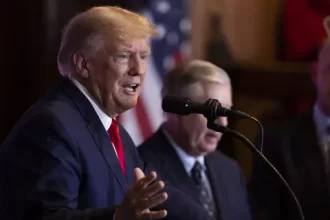Schumer intends to have expert-level sessions ‘later this autumn.’
When Senate Majority Leader Chuck Schumer, D-N.Y., launched a “major effort” in April to stamp the Senate’s mark on artificial intelligence policy, he spoke of an “urgency to act.” He promised that a legislative strategy would begin to take form in a matter of weeks.
“In the coming weeks, Leader Schumer plans to refine the proposal in collaboration with stakeholders from academia, advocacy organizations, industry, and government,” he said in a statement on April 13.
However, Schumer said on Thursday, more than two months later, that legislation may not be ready until 2024. In comments at the Center for Strategic and International Studies on Wednesday, Schumer said gathering feedback for the proposal would take months.
“Later this fall, I will convene the top minds in artificial intelligence here in Congress for a series of AI Insight Forums to lay down a new foundation for AI policy,” he said. Schumer said that developers, scientists, CEOs, national security specialists, and others must do “years of work in a matter of months,” implying that the endeavor may go far into next year.
He said that after this information is gathered, it would be up to politicians to listen and turn their ideas into laws. He identified various topics to be covered, such as how to preserve innovation, intellectual property rights, risk management, national security, avoiding “doomsday scenarios,” transparency, “explainability,” and privacy.
Making matters more complex, Schumer said that bipartisan cooperation is essential for the attempt and that many committees would be asked to contribute.
Schumer announced this week the SAFE Innovation Framework for AI, which aims to protect US innovation in this emerging field while ensuring security, accountability, support for human liberty, civil rights, and justice, and AI outputs can be explained to users.
However, Schumer stated similar intentions in April when he discussed the need to educate users, prevent the potential damage caused by AI outputs, and ensure AI systems adhere to “American values.”
According to Jake Denton, a technology policy research associate at the Heritage Foundation, Schumer’s new declaration essentially hints that the process is still in its early stages.
“The goalposts appear to be moving,” Denton told Fox News Digital. “We never get the bill text.” We never receive the specifics.”
The office of Senator Chuck Schumer refused to comment for this article.
Denton said the core concepts presented by Schumer twice now are widely accepted notions, but the problem will be translating them into law. A committee to govern AI policy, or perhaps a new agency that might license AI technology and guarantee it delivers outputs free of prejudice or discrimination, have been floated on Capitol Hill.
Based on the current pace, Denton believes Congress is still months or perhaps years away from implementing substantial legislation to control AI. He said the precedent exists because Congress has let other technologies grow before interfering.














